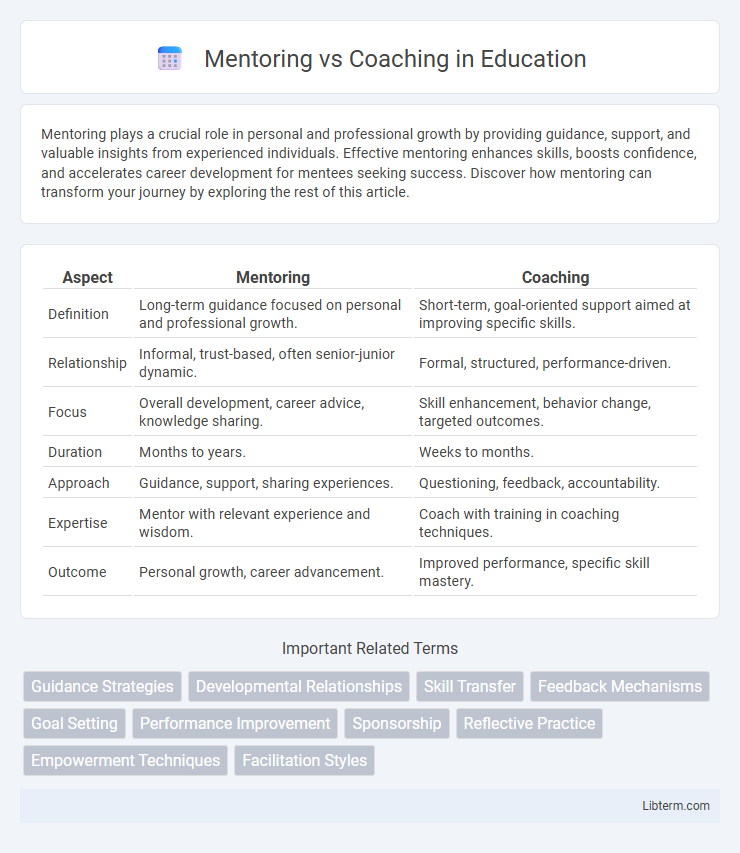Mentoring plays a crucial role in personal and professional growth by providing guidance, support, and valuable insights from experienced individuals. Effective mentoring enhances skills, boosts confidence, and accelerates career development for mentees seeking success. Discover how mentoring can transform your journey by exploring the rest of this article.
Table of Comparison
| Aspect | Mentoring | Coaching |
|---|---|---|
| Definition | Long-term guidance focused on personal and professional growth. | Short-term, goal-oriented support aimed at improving specific skills. |
| Relationship | Informal, trust-based, often senior-junior dynamic. | Formal, structured, performance-driven. |
| Focus | Overall development, career advice, knowledge sharing. | Skill enhancement, behavior change, targeted outcomes. |
| Duration | Months to years. | Weeks to months. |
| Approach | Guidance, support, sharing experiences. | Questioning, feedback, accountability. |
| Expertise | Mentor with relevant experience and wisdom. | Coach with training in coaching techniques. |
| Outcome | Personal growth, career advancement. | Improved performance, specific skill mastery. |
Understanding Mentoring and Coaching: Key Definitions
Mentoring involves a long-term relationship where an experienced individual provides guidance, support, and wisdom to foster personal and professional growth. Coaching is typically a short-term, goal-oriented process focused on enhancing specific skills and performance through structured feedback and development plans. Both mentoring and coaching aim to improve capabilities but differ in approach, duration, and scope of influence.
Core Differences Between Mentoring and Coaching
Mentoring involves a long-term relationship where an experienced professional provides guidance, knowledge transfer, and personal development, focusing on the mentee's overall growth and career progression. Coaching is typically short-term and performance-driven, targeting specific skills and goals with a structured approach to improve immediate job performance. The core difference lies in mentoring's emphasis on holistic development versus coaching's focus on measurable outcomes and skill enhancement.
Goals and Objectives: Mentoring vs Coaching
Mentoring focuses on long-term personal and professional growth, emphasizing holistic development and career guidance aligned with the mentee's aspirations. Coaching targets specific performance improvements or skill enhancements within a defined timeframe, using goal-setting techniques to achieve measurable outcomes. Both approaches drive success but prioritize different objectives--mentoring nurtures broad growth, while coaching delivers focused results.
Relationship Dynamics in Mentoring and Coaching
Mentoring relationships are typically long-term, emphasizing personal and professional growth through guidance and experience sharing, often involving a senior mentor and a junior mentee. Coaching relationships tend to be short-term and goal-oriented, focusing on specific skills or performance improvements through structured, solution-focused dialogue between coach and coachee. The dynamic in mentoring is built on trust, empathy, and developmental support, whereas coaching relies on accountability, feedback, and empowerment strategies.
Roles and Responsibilities of Mentors and Coaches
Mentors provide long-term guidance by sharing their experience, offering career advice, and supporting mentees' professional development through personalized relationships. Coaches focus on enhancing specific skills and performance, delivering structured feedback and goal-oriented strategies to improve the coachee's effectiveness. Both roles require active listening and communication, but mentors emphasize holistic growth while coaches target measurable outcomes.
Approaches and Techniques: Mentoring vs Coaching
Mentoring emphasizes a long-term relationship where an experienced mentor provides guidance, wisdom, and support based on personal experience, using techniques like storytelling, advice-giving, and active listening to foster professional growth. Coaching, in contrast, employs goal-oriented, structured approaches such as questioning, feedback, and performance monitoring to develop specific skills and improve immediate outcomes. Both use tailored communication but differ in their focus; mentoring nurtures overall development, while coaching targets particular competencies and measurable progress.
Duration and Structure of Engagements
Mentoring engagements typically span long-term relationships with a flexible, evolving structure tailored to the mentee's growth over time. Coaching engagements are usually short-term and goal-specific, featuring structured sessions with defined objectives and measurable outcomes. The duration and framework of mentoring allow for holistic development, while coaching emphasizes immediate performance improvement within a set timeframe.
Ideal Scenarios for Mentoring and Coaching
Mentoring is ideal in scenarios where long-term personal and professional growth is desired, emphasizing knowledge transfer and skill development through experienced guidance. Coaching fits best in situations requiring performance improvement, goal setting, and accountability within a shorter timeframe, often focusing on specific skills or challenges. Organizations benefit by leveraging mentoring for career development and coaching for targeted skill enhancement and behavioral change.
Measuring Success: Outcomes and Impact
Measuring success in mentoring involves evaluating long-term growth, increased skills, and career advancement, often tracked through mentee feedback and goal achievement over time. Coaching success is typically assessed using specific performance metrics, such as productivity improvements, behavioral changes, and short-term results linked to targeted objectives. Both approaches require clear frameworks and regular assessments to accurately gauge outcomes and overall impact on professional development.
Choosing the Right Approach for Individual or Organizational Growth
Selecting between mentoring and coaching hinges on the specific growth needs of individuals or organizations; mentoring offers long-term guidance and wisdom transfer rooted in experience, while coaching delivers targeted skill enhancement and performance improvement through structured, goal-oriented sessions. Organizations aiming for sustained leadership development may benefit from mentoring programs that cultivate knowledge sharing and cultural alignment; individuals seeking rapid skill acquisition and behavioral change often find coaching more effective. Tailoring the approach based on desired outcomes, timelines, and the nature of objectives ensures optimized personal and organizational growth trajectories.
Mentoring Infographic

 libterm.com
libterm.com